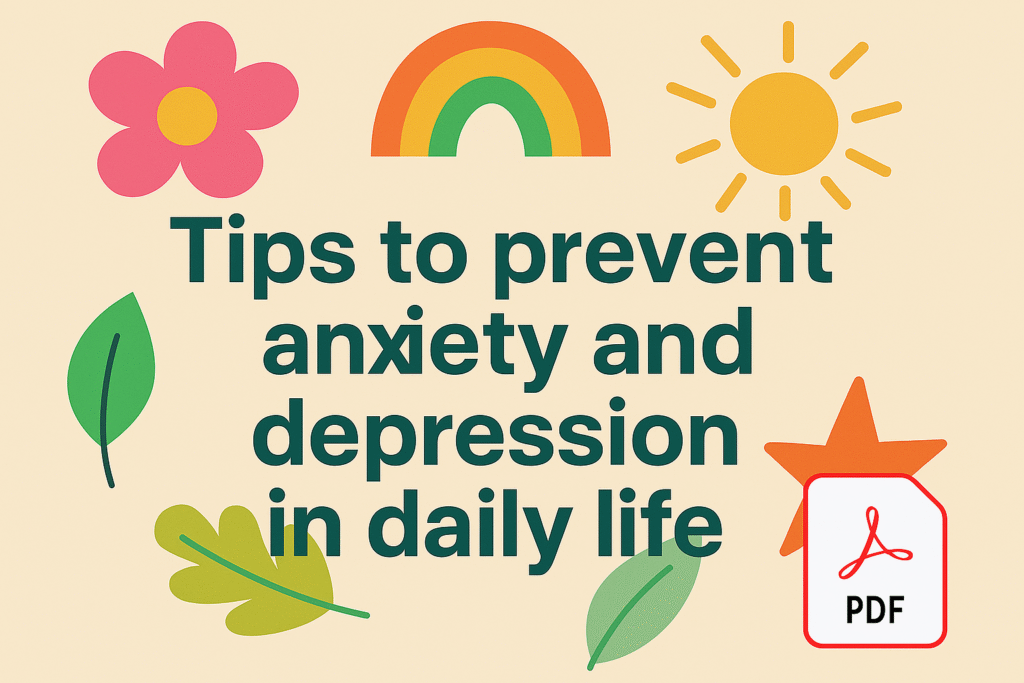Anxiety and depression don’t always come with a loud knock. Sometimes, they tiptoe quietly into our lives, showing up as constant worry, emotional fatigue, or a sense of emptiness that’s hard to shake. In a world that moves fast and demands more, it’s easy to overlook our emotional well being until we can’t anymore.
But the good news is: you can take small, intentional steps each day to protect your mental health. You don’t have to wait for things to fall apart before you take care of yourself.
Here are some real, compassionate, and practical tips to help you prevent anxiety and depression in your everyday life gently and sustainably.
🌞 1. Start Your Morning Without Screens
Before diving into emails, news, or social media, give yourself 15–30 minutes of quiet, offline time. Use this space to stretch, breathe, journal, or simply sit with your thoughts. How you start your day sets the emotional tone for everything that follows.
🧠 2. Acknowledge Your Emotions Without Judgment
It’s okay to feel overwhelmed. It’s okay to have off days. What matters is allowing those feelings to exist without labeling yourself as weak. Give your emotions space they’re messengers, not enemies.
🥦 3. Feed Your Body, Feed Your Mind
Nutrition plays a silent but powerful role in mental health. Diets rich in whole foods fruits, vegetables, omega-3s, nuts have been linked to better emotional regulation. You don’t need a perfect diet, just a balanced one.

🚶♂️ 4. Move, Even a Little
Exercise doesn’t mean hitting the gym hard every day. A short walk, dancing to your favorite song, or gentle stretching can help release tension, increase endorphins, and ground you in the present.
💬 5. Talk to Someone You Trust
Human connection is a natural antidote to isolation. Reach out to a friend, family member, or support group. Even if you’re not ready to talk deeply, a simple “how’s your day going?” can begin to open a door.
📵 6. Reduce Information Overload
Constant news updates, doomscrolling, and excessive screen time can quietly drain your energy and heighten anxiety. Set daily limits, take breaks, and replace digital noise with something soothing like a walk in nature or an uplifting podcast.
✍️ 7. Journal for 5 Minutes
Journaling helps bring order to chaotic thoughts. Try writing one sentence a day about what’s bothering you, what you’re grateful for, or what you’re learning about yourself. Over time, your journal becomes a mirror of growth.
😴 8. Prioritize Rest Not Just Sleep
True rest isn’t just about getting eight hours. It’s about giving your mind and body breaks during the day whether that’s a short nap, a slow meal, or sitting in silence. Burnout starts when we ignore our need to pause.
📚 9. Set Realistic Goals
Overcommitting leads to overwhelm. Instead, break your tasks into small, achievable goals. Celebrate progress, not perfection. You’re not behind you’re building something, one step at a time.
💖 10. Practice Self Compassion
Talk to yourself like you would a close friend. Would you call them a failure for feeling low? Probably not. Remind yourself that you’re doing your best, and that’s more than enough.
🌱 Final Thoughts: Prevention is a Daily Practice
You don’t need to overhaul your life to prevent anxiety and depression. Often, it’s the gentle, consistent choices that protect our peace small actions that add up to something powerful.
If this blog resonated with you, know that you’re not alone and that help, healing, and hope are within reach.
It’s filled with simple daily routines, mindset shifts, and self care practices backed by research and written with empathy.
Visit more blogs for your daily life problems here


Pingback: Teen Concussions: Early Warning Signs & Realistic Recovery Timelines - foncentra.com